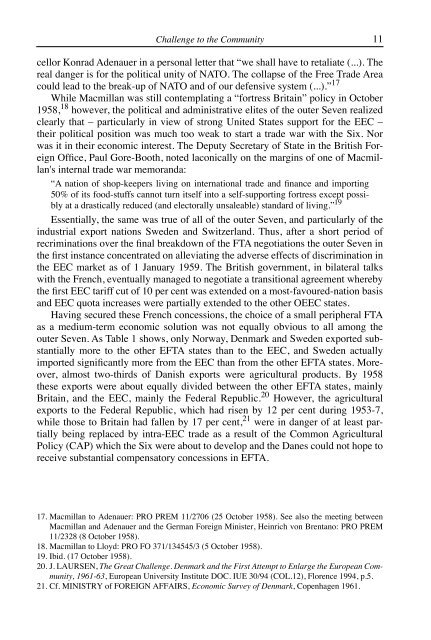Journal of European Integration History – Revue d'histoire de l'
Journal of European Integration History – Revue d'histoire de l'
Journal of European Integration History – Revue d'histoire de l'
- No tags were found...
Create successful ePaper yourself
Turn your PDF publications into a flip-book with our unique Google optimized e-Paper software.
Challenge to the Community 11cellor Konrad A<strong>de</strong>nauer in a personal letter that “we shall have to retaliate (...). Thereal danger is for the political unity <strong>of</strong> NATO. The collapse <strong>of</strong> the Free Tra<strong>de</strong> Areacould lead to the break-up <strong>of</strong> NATO and <strong>of</strong> our <strong>de</strong>fensive system (...).” 17While Macmillan was still contemplating a “fortress Britain” policy in October1958, 18 however, the political and administrative elites <strong>of</strong> the outer Seven realizedclearly that <strong>–</strong> particularly in view <strong>of</strong> strong United States support for the EEC <strong>–</strong>their political position was much too weak to start a tra<strong>de</strong> war with the Six. Norwas it in their economic interest. The Deputy Secretary <strong>of</strong> State in the British ForeignOffice, Paul Gore-Booth, noted laconically on the margins <strong>of</strong> one <strong>of</strong> Macmillan'sinternal tra<strong>de</strong> war memoranda:“A nation <strong>of</strong> shop-keepers living on international tra<strong>de</strong> and finance and importing50% <strong>of</strong> its food-stuffs cannot turn itself into a self-supporting fortress except possiblyat a drastically reduced (and electorally unsaleable) standard <strong>of</strong> living.” 19Essentially, the same was true <strong>of</strong> all <strong>of</strong> the outer Seven, and particularly <strong>of</strong> theindustrial export nations Swe<strong>de</strong>n and Switzerland. Thus, after a short period <strong>of</strong>recriminations over the final breakdown <strong>of</strong> the FTA negotiations the outer Seven inthe first instance concentrated on alleviating the adverse effects <strong>of</strong> discrimination inthe EEC market as <strong>of</strong> 1 January 1959. The British government, in bilateral talkswith the French, eventually managed to negotiate a transitional agreement wherebythe first EEC tariff cut <strong>of</strong> 10 per cent was exten<strong>de</strong>d on a most-favoured-nation basisand EEC quota increases were partially exten<strong>de</strong>d to the other OEEC states.Having secured these French concessions, the choice <strong>of</strong> a small peripheral FTAas a medium-term economic solution was not equally obvious to all among theouter Seven. As Table 1 shows, only Norway, Denmark and Swe<strong>de</strong>n exported substantiallymore to the other EFTA states than to the EEC, and Swe<strong>de</strong>n actuallyimported significantly more from the EEC than from the other EFTA states. Moreover,almost two-thirds <strong>of</strong> Danish exports were agricultural products. By 1958these exports were about equally divi<strong>de</strong>d between the other EFTA states, mainlyBritain, and the EEC, mainly the Fe<strong>de</strong>ral Republic. 20 However, the agriculturalexports to the Fe<strong>de</strong>ral Republic, which had risen by 12 per cent during 1953-7,while those to Britain had fallen by 17 per cent, 21 were in danger <strong>of</strong> at least partiallybeing replaced by intra-EEC tra<strong>de</strong> as a result <strong>of</strong> the Common AgriculturalPolicy (CAP) which the Six were about to <strong>de</strong>velop and the Danes could not hope toreceive substantial compensatory concessions in EFTA.17. Macmillan to A<strong>de</strong>nauer: PRO PREM 11/2706 (25 October 1958). See also the meeting betweenMacmillan and A<strong>de</strong>nauer and the German Foreign Minister, Heinrich von Brentano: PRO PREM11/2328 (8 October 1958).18. Macmillan to Lloyd: PRO FO 371/134545/3 (5 October 1958).19. Ibid. (17 October 1958).20. J. LAURSEN, The Great Challenge. Denmark and the First Attempt to Enlarge the <strong>European</strong> Community,1961-63, <strong>European</strong> University Institute DOC. IUE 30/94 (COL.12), Florence 1994, p.5.21. Cf. MINISTRY <strong>of</strong> FOREIGN AFFAIRS, Economic Survey <strong>of</strong> Denmark, Copenhagen 1961.
















